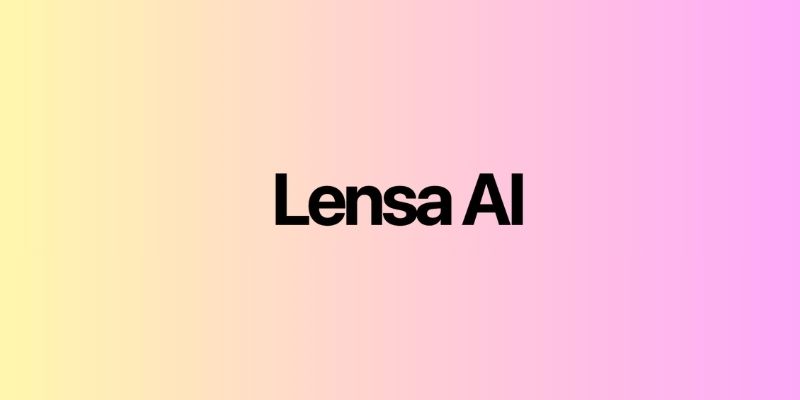Advertisement
The Lensa AI app quickly gained attention for creative photo edits and stylized digital portraits. However, behind the entertainment, Lensa raises serious questions. It collects user inputs and facial data, which raises significant privacy concerns. Many users are concerned about how their data is stored, accessed, or potentially sold. Others raise ethical concerns about how AI-generated images portray individuals. Can users safely trust AI with their images? These concerns go beyond simple filters and fun visual effects.
Many now question whether Lensa adequately protects user data and digital rights. Public debate has intensified as the app’s popularity grows. With success comes responsibility for how user data is managed. The intersection of digital identity, privacy rights, and data usage introduces serious risks. Questions about privacy, AI photo ethics, and digital rights are shaping the app’s future.

Lensa generates stylized AI images by requiring users to upload personal photos. Once uploaded, the images do not simply disappear. These photos are processed by AI models that require large amounts of training data. The models analyze facial structure, expressions, and subtle features to generate output. Lensa claims the data was deleted after processing, though there was little independent verification. Users agree on conditions without knowing how their pictures might be kept or shared. Many people are unaware they could be forfeiting rights to their likeness.
The app’s terms mention using user photos to train AI models, which raises further questions. In many cases, training models involve retaining user data longer than advertised. Experts have voiced significant privacy concerns over these unclear and potentially misleading data policies. There is little transparency, and responsibility remains poor. What your face looks like after upload is usually not known. These artificial intelligence photo ethical questions demand careful thought. People require clear control over their digital identity and image usage for these products.
Often, users accept terms without fully understanding what they are agreeing to. Lensa’s privacy policy and terms of service are filled with complex legal language. Many users are unaware they are granting the app broad rights over their uploaded content. These rights may include reproduction, modification, and commercial use of the images. It generates a risky power difference between consumers and app developers. The problem concerns informed authorization rather than only rights. Can consumers grasp what is occurring even if they theoretically agree?
Lensa and similar entertainment-focused apps are not designed with legal clarity in mind. However, ethical design should still prioritize user awareness and control. A simple photo upload should not require users to give up ownership rights. With every new viral artificial intelligence fad, digital rights problems get more pressing. Policies must be clearer, and stronger protections must be demanded. Personal photos can be exploited in ways consumers never imagined without more protection. Consent has to be more than a click-through or checkbox.
Advanced algorithms in the Lensa app transform user selfies into stylized artwork. However, beneath those filters lie serious privacy concerns raised by critics. AI systems must be trained on vast datasets to function effectively. These datasets often include real photographs submitted by millions of users. Lensa might gather information to raise performance, but at what cost? This information could be used, shared, or leaked without appropriate restrictions. Users have no idea how long Lensa’s systems hold their data.
The AI may still identify patterns or trends after the data is deleted. There is also a risk of third-party misuse or surveillance. Apps that collect biometric data—such as facial geometry—operate in legally sensitive territory. Misuse of data might cause artificial intelligence impersonation or identity theft. These risks make a basic selfie a major privacy hazard. AI photo ethics call for ethical design, not only for decent outcomes. User data protection has to be the first concern.

The program generates avatars for users that might not be reflective. Some users observed their avatars had changed, lightened, or become hypersexualized. These developments beg questions regarding how artificial intelligence sees and reproduces human identity. Skewed representations in training data can result from bias. Should the AI have been taught largely on white, Western faces, its outputs would show that prejudice. Users of color, women, and non-binary people could get less respectful or accurate outcomes. It influences people’s self-perception; hence, it transcends mere erroneous art.
These AI-generated photos often support beauty standards other cultures do not follow. Lensa, either purposefully or not, could be feeding preconceptions. Lack of diversity in training data causes erasure of identity. Artificial intelligence applications have to understand the weight of representation. Every digital image speaks to something about value, culture, and worth. Ethical artificial intelligence should respectfully and authentically represent the user. One of the digital rights concerns is the right to correct identity representation.
Lensa operates in a space where innovation has outpaced regulation. Laws governing biometric data are still evolving. Some jurisdictions, such as Illinois, prohibit collecting facial data without explicit consent. Meanwhile, many countries still lack clear policies on biometric data use. This legal vacuum allows AI applications to operate with minimal oversight. Users depend more on corporate promises than on legislative assurances. Lensa says data is erased; there is no outside confirmation. Governments must develop clear rules for artificial intelligence photo apps.
Standards should include data storage limits, clear consent protocols, and regular audits. Users today have limited options to challenge misuse or data violations. Legal systems must protect individuals from intrusive data collection and surveillance. Without strong regulations, companies can operate without meaningful oversight. Digital rights issues demand concrete legal action, not vague promises. People will demand more protection as artificial intelligence develops quickly. Governments have to intervene to ensure the moral and legal usage of personal photographs using such platforms.
Lensa AI delivers impressive visual results but raises serious ethical and privacy concerns. Expert commentary and user privacy concerns reflect deeper trust issues. The app blurs the boundaries of consent and risks misusing user photos. Concerns about AI photo ethics and digital rights can no longer be ignored. Companies must handle user data with transparency, integrity, and care. Robust regulations and responsible design practices are essential. Users deserve to know where their data goes and how it is used. Trust, fairness, and respect for user rights across platforms will shape the future of AI-driven creativity.
Advertisement

How Netflix Case Study (EDA) reveals the data-driven strategies behind its streaming success, showing how viewer behavior and preferences shape content and user experience

Explore how AI agents are transforming the digital workforce in 2025. Discover roles, benefits, challenges, and future trends

Intel’s deepfake detector promises accuracy but sparks ethical debates around privacy, data usage, and surveillance risks

Want to save time processing forms? Discover how Azure Form Recognizer extracts structured data from documents with speed, accuracy, and minimal setup

Apple’s AI-powered RoomPlan uses LiDAR and AI to create accurate 3D room models that integrate seamlessly with top design apps

Automation Anywhere uses AI to enhance process discovery, enabling faster insights, lower costs, and scalable transformation

Find how AI is transforming the CPG sector with powerful applications in marketing, supply chain, and product innovation.

Master GPT-4.1 prompting with this detailed guide. Learn techniques, tips, and FAQs to improve your AI prompts

Compare Microsoft, Copilot Studio, and custom AI to find the best solution for your business needs.

Explore how AI innovates the business world and what the future of AI Transformation holds for the modern business world

Discover 7 effective ways to accelerate AI software development and enhance speed, scalability, and innovation in 2025.

Discover how Cerebras’ AI supercomputer outperforms rivals with wafer-scale design, low power use, and easy model deployment